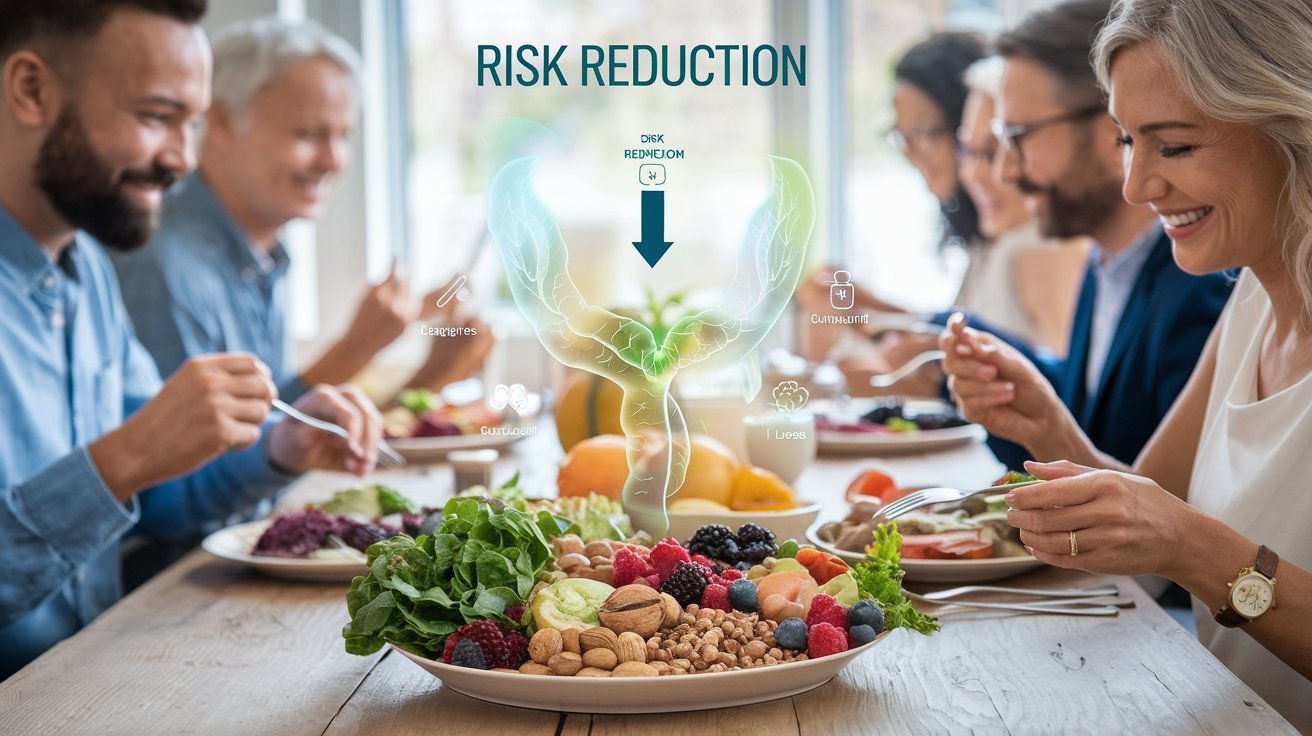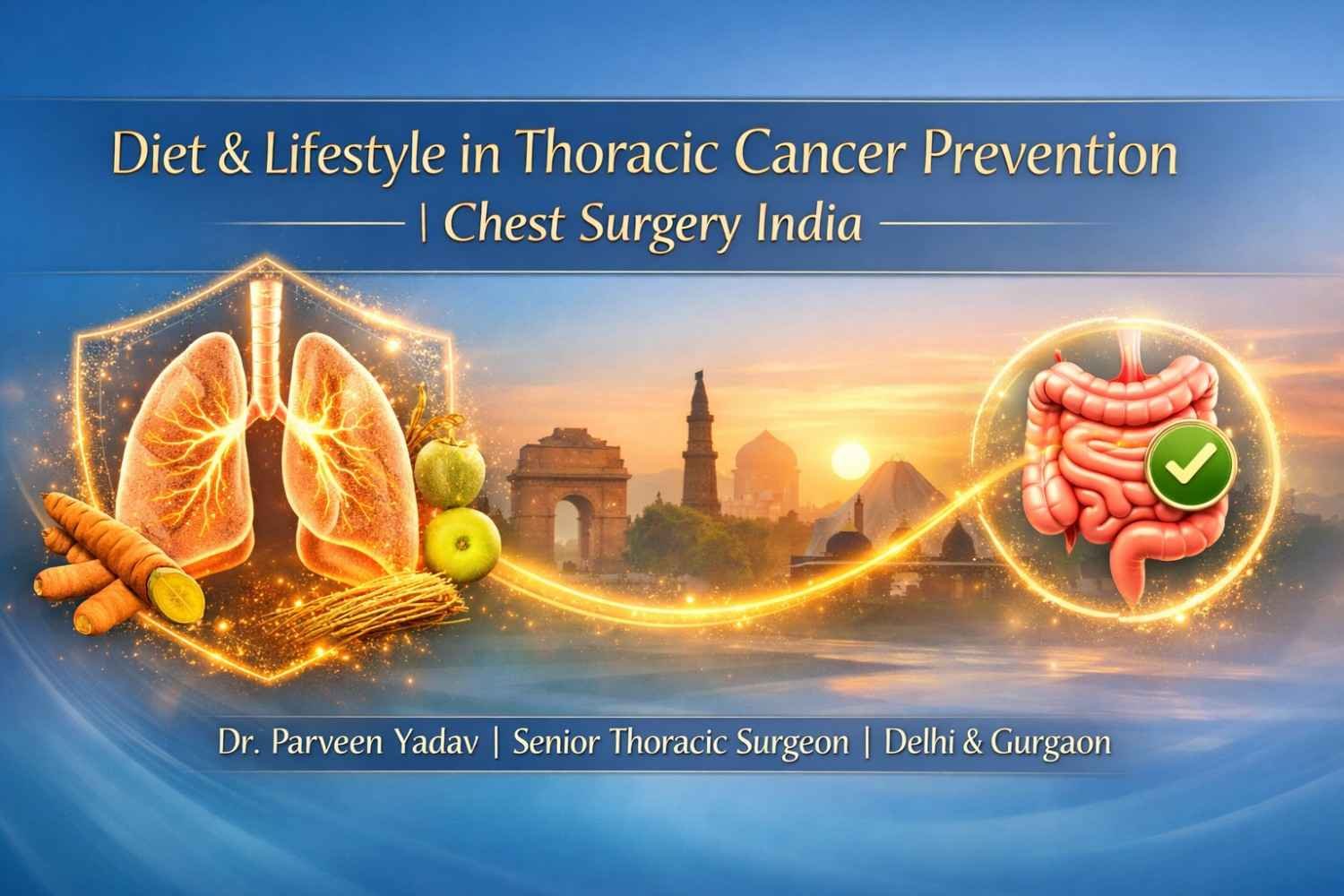

Did you know your diet could be a powerful shield against oesophagal cancer? What you eat determines your overall health, including your risk of developing this deadly disease. Research suggests that making smart dietary choices can significantly lower the chances of oesophagal cancer by reducing inflammation, preventing acid reflux, and neutralizing harmful free radicals.
Dr Parveen Yadav, a leading expert in oesophagal cancer treatment, has dedicated years to studying how diet influences cancer risk. By understanding the connection between nutrition and oesophagal health, you can take proactive steps to protect yourself.
Oesophagal cancer is a serious condition that happens when malignant cells form in the lining of the oesophagus. It is primarily categorized into two types:
Several factors increase the likelihood of developing esophageal cancer:
Understanding these risk factors is important in taking preventive measures, including adopting a healthier diet.
The food you eat directly affects the health of your oesophagus and plays a significant role in cancer prevention. Here’s how:
Gastroesophageal reflux disease (GERD) is one of the significant contributors to oesophagal cancer. When stomach acid repeatedly flows back into the oesophagus, it causes inflammation and damage. Over time, this can lead to Barrett’s oesophagus, a condition where the oesophagal lining changes abnormally, increasing the risk of cancer.
Oxidative stress happens when free radicals (unstable molecules) accumulate in the body, damaging cells and DNA. This cellular damage increases cancer risk. Certain foods rich in antioxidants can help neutralize these free radicals and protect the oesophagus.
Certain dietary habits can introduce carcinogens (cancer-causing agents) into the body. Processed meats, fried foods, and excessive Alcohol can increase the likelihood of oesophagal cell mutations, leading to cancer development.
Modifying your diet can significantly reduce these risk factors and promote oesophagal health.
Dietary changes are among the most practical ways to reduce oesophagal cancer risk. The right foods can lower inflammation, protect cells from oxidative damage, and reduce acid reflux—key factors in cancer prevention. Below are the best foods to include in your diet:
Antioxidants are crucial in preventing cancer by neutralizing harmful free radicals that can damage DNA. Studies have shown that a diet high in antioxidant-rich foods is associated with a lower chance of oesophagal cancer.
How They Help:
Antioxidants protect oesophagal cells from oxidative stress, reducing the likelihood of DNA mutations that can lead to cancer.
Fibre plays a vital role in digestive health and cancer prevention. It assists digestion, helps maintain a healthy weight, and reduces acid reflux, one of the leading causes of oesophagal cancer.
How They Help:
High-fibre diets are linked to a lower risk of digestive cancers, including oesophagal cancer, because they reduce acid reflux and prevent obesity, a key risk factor.
Protein is essential for repairing damaged tissues, while omega-3 fatty acids have powerful anti-inflammatory properties.
How They Help:
Lean proteins support tissue repair, while omega-3s fight inflammation, reducing oesophagal irritation and cancer risk.
Green tea is loaded with powerful antioxidants like epigallocatechin gallate (EGCG), which has been shown to have cancer-fighting properties. Chamomile tea is soothing for acid reflux and helps calm the digestive system.
How It Helps:
Drinking green tea regularly may decrease the risk of oesophagal cancer by protecting cells from DNA damage and reducing inflammation.
Specific foods can help lower the risk of oesophagal cancer, but others can increase it. Processed, acidic, high-fat foods contribute to chronic acid reflux, inflammation, and oxidative stress, which can damage the oesophagus over time. Avoiding or limiting these foods can play a significant role in cancer prevention.
Highly processed meats contain nitrates and nitrites, which are known carcinogens that have been linked to digestive cancers.
Why Avoid?
Studies show that excessive consumption of processed and red meats is correlated with a higher risk of oesophagal and colorectal cancers due to their high levels of saturated fat and carcinogenic compounds.
Certain foods can trigger acid reflux, which is a significant risk factor for oesophagal cancer. Spicy, fried, and highly acidic foods weaken the oesophagal lining and increase inflammation.
Why Avoid?
Acid reflux is a leading cause of Barrett’s oesophagus, a precancerous condition that significantly raises oesophagal cancer risk.
Alcohol and carbonated drinks weaken the lower oesophagal sphincter (LES), the muscle that controls stomach acid from flowing back into the oesophagus. Excessive alcohol consumption is also directly linked to oesophagal cancer.
Why Avoid?
Regular alcohol consumption increases oesophagal cancer risk, especially when combined with smoking. Carbonated drinks worsen reflux, which can damage the oesophagus over time.
While diet is crucial in lowering oesophagal cancer risk, your lifestyle choices also have a significant impact. Small daily habits can help reduce acid reflux, promote a healthier oesophagus, and lower overall cancer risk.
Excess weight, particularly around the abdomen, puts pressure on the stomach and weakens the lower oesophagal sphincter (LES), increasing acid reflux and GERD symptoms.
What to Do:
Why It Matters?
Studies show that obesity doubles the chance of oesophagal adenocarcinoma, mainly due to chronic acid reflux.
Eating too close to bedtime increases the likelihood of acid reflux, as the stomach takes time to digest food properly.
What to Do:
Why It Matters?
Lying down after eating can induce stomach acid to flow back into the oesophagus, leading to irritation and increasing cancer risk over time.
Both smoking and Alcohol are major contributors to oesophagal cancer. Smoking weakens the oesophagal lining, while Alcohol increases acid reflux and introduces carcinogens into the body.
What to Do:
Why It Matters?
Smoking increases the chance of oesophagal squamous cell carcinoma up to fivefold, and combining smoking with Alcohol makes it even more dangerous.
If you experience frequent acid reflux, sleeping with your head elevated can help contain stomach acid from flowing back into the oesophagus.
What to Do:
Why It Matters?
Sleeping with a slightly elevated head helps keep stomach acid in place, reducing nighttime reflux symptoms.
Appropriate hydration supports digestion and prevents excessive stomach acid buildup.
What to Do:
Why It Matters?
Hydration helps keep the mucous lining of the oesophagus healthy, reducing irritation from acid reflux.
Your diet is more powerful than you think. The foods you consume can either fuel inflammation and acid reflux or act as a protective shield against oesophagal cancer. You can greatly reduce your risk by incorporating antioxidant-rich fruits and vegetables, fibre-packed whole grains, and anti-inflammatory omega-3s into your daily meals. At the same time, avoiding processed meats, fried foods, Alcohol, and acidic beverages can help keep your oesophagus healthy.
But diet is just one part of the puzzle. Maintaining a healthy weight, quitting smoking, managing acid reflux, and staying hydrated are all critical lifestyle changes that complement your diet and reduce oesophagal cancer risk.
If you’re at high risk—whether due to chronic GERD, smoking, obesity, or a family history of oesophagal cancer—now is the time to take action. Early screenings, expert guidance, and personalized diet plans can help you stay ahead.
Dr Parveen Yadav is a leading expert in oesophagal cancer treatment and prevention. Whether you need a personalized diet plan, acid reflux management strategies, or an early screening appointment, he’s here to help.
Schedule a consultation today at Chest Surgery India and take control of your oesophagal health before it’s too late.
Your health is in your hands—make the right choices today for a cancer-free future.
1. Can diet alone prevent esophageal cancer?
A healthy diet can greatly lower the risk by reducing acid reflux, inflammation, and oxidative stress. Regular screenings and lifestyle changes also play a key role.
2. What foods soothe acid reflux?
Foods like oatmeal, bananas, ginger, green vegetables, and almond milk can help neutralize stomach acid and prevent reflux. Avoid spicy, acidic, and fried foods.
3. How often should I get screened for oesophagal cancer?
If you have GERD or Barrett’s oesophagus, screening every 3-5 years is recommended. High-risk individuals (smokers and heavy drinkers) should consult a doctor for screening guidelines.
4. Are there supplements that help prevent oesophagal cancer?
Antioxidants (Vitamin C, E, and Omega-3s) and anti-inflammatory supplements (curcumin, probiotics) may help, but they should not replace a healthy diet.
5. Can drinking green tea reduce oesophagal cancer risk?
Green tea contains EGCG, a powerful antioxidant that may help protect against oesophagal cancer. However, avoid drinking it too hot, as excessive heat can irritate the oesophagus.

18+ Yrs Exp | 5,700+ Thoracic & Robotic Cancer Surgeries
Dr. Parveen Yadav is a Director and Senior Consultant in Thoracic and Surgical Oncology, specializing in minimally invasive and robotic lung and esophageal surgeries, with advanced training from AIIMS and Tata Memorial Hospital.
View Full Profile Pain After Thoracic Surgery: Tips for Smooth Recovery
Pain After Thoracic Surgery: Tips for Smooth Recovery
 Diet & Lifestyle for Thoracic Cancer Prevention | Dr. Parveen Yadav
Diet & Lifestyle for Thoracic Cancer Prevention | Dr. Parveen Yadav
 Robotic Thoracic Surgery: How Da Vinci Technology is Revolutionizing Chest Procedures
Robotic Thoracic Surgery: How Da Vinci Technology is Revolutionizing Chest Procedures
Struggling with pain after chest surgery? Dr. Parveen Yadav shares expert recovery tips, causes of shoulder pain, PTPS signs, and what your discharge sheet won't tell you.
Discover how diet, breathing exercises & daily habits help prevent and recover from thoracic cancer. Expert insights from Dr. Parveen Yadav, Chest Surgery India
Discover how Da Vinci robotic surgery is transforming chest procedures in Gurgaon. Less pain, faster recovery & expert care by a certified thoracic surgeon
Copyright 2026 © Dr .Parveen Yadav all rights reserved.
Proudly Scaled by Public Media Solution!